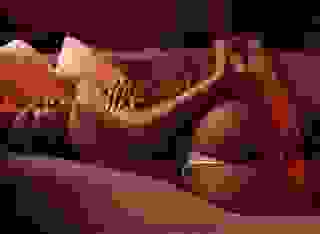Note: You can change font size, font face, and turn on dark mode by clicking the "A" icon tab in the Story Info Box.
You can temporarily switch back to a Classic Literotica® experience during our ongoing public Beta testing. Please consider leaving feedback on issues you experience or suggest improvements.
Click hereReggie slumped back against the wall, trying to focus on anything other than the events that had just occurred or the acidic taste in his mouth. Acidic and metallic, he thought, . . . Metallic? Curious, Reggie looked down where he had thrown up to see a watery, reddish-brown puddle. Great, now I'm vomiting blood, Reggie thought.
He smelled blood, too. It wasn't the vomit, either, which had a distinctly acidic smell. No, he smelled blood, specifically blood. Then he remembered his hand, the hand that had crushed the punk's wrist, was coated in blood.
Reggie looked at his hand, even became entranced by it. His eyes closed as he held it to his face, taking in the scent of it. He drew it close, and tasted the blood on it. A certain amount of strength and warmth and power began to wash back over him. His breathing slowed, his pulse calmed, he relaxed, and he felt well.
Reggie's eyes snapped open and he realized what he was doing. He scrambled to his feet, crouched down, and gagged himself with his clean hand. After he vomited again, he looked around for something with which to wipe the blood from his hand, finally finding some scraps of newspaper. He wiped off his hand and his mouth, and then, looking at the newspaper, he realized how late he was running.
Reggie dropped the newspaper and ran off toward the "Star Tribune" building, now paying no mind to anyone who might be watching or following him, not feeling tired or sick in any way, except spiritually, as if he had somehow violated himself. As he ran, he said to himself, over and over, "As I walk through the valley of the shadow of Death, I shall fear no evil . . ."
Reggie arrived at the bullpen of the paper only a little after nine-thirty, and no sooner had he come in the door from the stairs, than he ran nearly head-on into Denny, who was weighed down by a stack of papers practically a foot thick.
"Hey! Watch Out!" Denny exclaimed, but it was too late. The stack of papers flew out of Denny's hands, file folders opened in midair and papers spilled out all over the bullpen floor. Denny stumbled and tripped over his own feet to keep from stepping on the papers.
"Why don't you watch where you're going?"
"Watch yourself, rookie," Reggie said, then he simply skulked his way back to his desk. Denny scrambled and struggled to pick up his papers, at first spending a few very futile moments attempting to determine some semblance of order to the papers, then, figuring fuck it, he grabbed stack after stack until he had the whole mess. Haphazardly holding them, he made his way precariously back to his desk and dropped the giant paper salad on top of it. He plopped down in his rickety office chair and sighed deeply, staring at the mountain of files in front of him.
"JENKINS!!" erupted the bellowing shout from the door to Bert's office that shook pens and pencils in their jars.
Denny fell over backwards in his chair, his feet kicking up the clipboard under the pile of papers, sending them flying everywhere. He hopped to his feet, dusted himself off and noticed the array of generally annoyed faces glaring at him. He looked up to see Bert watching him like a hawk and chewing on a smoldering cigar.
Sheepishly, Denny asked, "Yes?"
"My office, now."
Denny glanced down at the collapsed remains of the chair, then over his shoulder at the debris that covered his desk and the desk facing it.
"Today, Jenkins."
Denny walked up between the other desks, trying to avoid the gaze of the other reporters in the bullpen, and, more importantly, Bert's gaze as well. He walked through the door to Bert's office and stopped just inside. Bert watched him every step of the way, then turned back to the bullpen, shouted, "Back to work!", and slammed the door behind him. He turned back to Denny.
"Sit down."
"Uh, sir, before--"
"Just sit your ass in a chair and don't say a damn thing."
Denny sat down as quickly as he could, wishing as desperately as he could that he could be anywhere else. Find a happy place, he thought.
"So, I've been on the phone for the last hour. Guess with who," said Bert, barely giving Denny enough time to squeak out a quick, "Um," before answering himself, "Legal. They were kind enough to inform me that the city of Minneapolis is suing us for libel in response to your story yesterday."
"WHAT!!" Denny shouted, forgetting momentarily how small Bert's office was.
"They're also demanding a retraction."
"Fuck No!"
"That was my reaction," Bert remarked, sitting calmly behind his desk, "Now, before we do anything else, I need to ask: Did you in any way place any information in your article that cannot be backed up by fact or proven as true?"
Denny was still fuming and resolute, but he managed to confine his remarks to, "Absolutely not!"
"Understand this, Denny," Bert explained, moving on as though he hadn't heard the answer, "I hate questioning the integrity or legitimacy of my reporters or their stories, but I need to ask, because I'll put my reputation and my ass on the line for you and your story if it's the truth, but if it's not," although nothing in Bert's appearance, face, tone or attitude changed, Denny could have sworn that there was now a darkness or an intensity about him that hadn't been there before, "if it's not, I will spare no expense to destroy your reputation, your career, and your future in journalism, so . . ."
There was an awkward silence between them as Bert gave Denny a moment to calm down.
Denny took a deep breath and said, "Mr. Garvey, I have all of the evidence and documentation to back up absolutely one hundred percent of my article."
"What's more," he continued, cutting Bert off without realizing it, " the documents are copies of government documents passed to me by way of an anonymous source, (who's identity I will not disclose) so the government was more than aware of all of that before I wrote about it. There is no way in hell that they have grounds for libel, and I'd be willing to bet that legal will agree that we have grounds for quite a profitable deformation counter suit."
Bert watched a moment to make sure that Denny had run out of steam, then, once he saw that the poor kid was beginning to get more nervous, he smiled and said, "Good. That's exactly what I wanted to hear."
Denny breathed a sigh of relief, then, realized that he still had a lawsuit on his hands.
"So, what do I do now?"
"Just stay put and stay quiet," Bert said, starting to dial his phone, "I've got a phone call to make that you are not gonna want to miss."
Bert switched the phone over to speaker. They listened as the phone rang, and then heard someone pick up.
"Mayor Andrews' office, this is Julie speaking."
Her voice was sweet, congenial, and phonier than a telemarketer, and she didn't have a script to read from. Bert took the same tactic and matched her tone for tone.
"This is Bertram Garvey, Editor-in-Chief of the 'Star Tribune' calling to speak to the Mayor."
"The Mayor is in a meeting right now, Mr. Garvey, may I take a message?"
"Actually, Miss, it is terribly urgent that I speak with the Mayor immediately."
"May I ask what this is regarding, Mr. Garvey?"
Denny thought he heard a twinge of impatience in the secretary's voice. But Bert was a pro; he could not have been friendlier.
"Well, it just so happens to be regarding a completely unfounded lawsuit which your office has filed against my paper, and the highly profitable and, as my lawyers have assured me, fully airtight deformation counter suit which they are drawing up in response, my dear. So if you could find it at all possible to drag his honor away from reruns of 'American Gladiators', then I won't be forced to contact your office by way of a subpoena."
Denny smiled in complete awe of Bert, while the mayor's secretary simply said, "Hold please."
Bert looked up at Denny grinned more slyly than Denny thought possible and said, "That was fun."
"Alright, Garvey, what the hell is this about a counter-suit?" Andrews asked.
"Well, Mr. Mayor, I'm looking at official police documents which back up every word of the article in question, and my lawyers have assured me that if you proceed with this lawsuit and I counter sue, I am guaranteed to win."
Denny's eyes went wide at Bert's semi-bluff. He also found little comfort in the fact that the Mayor was taking his time answering.
"Are you still there, Mr. Mayor?" asked Bert, also noticing the long pause.
"Yes, Mr. Garvey, I'm still here," Andrews answered, obviously distracted, "May I put you on hold for a moment?"
"Of course."
There was a click, then the faint sounds of "The Girl From Ipanima" began to emanate from the speakerphone.
"What's happening?" Denny asked in a whisper.
Bert said nothing, but simply shook his head and mouthed the words, "Wait, just wait," to Denny. After a moment, the music cut out.
"Mr. Garvey," said the Mayor.
"Yes, Mr. Mayor?"
"I've consulted with our lawyers and we've decided to drop the lawsuit."
Denny breathed a sigh of relief and looked at Bert, who was smiling.
Then the Mayor added, "But we're still going to need that retraction," which neither Denny nor Bert thought they had heard quite clearly.
"Excuse me, Mr. Mayor," Bert asked, "Could you repeat that please?"
The Mayor repeated, "We're still going to need that retraction."
"Why the hell would we do that?" Denny said, unable to control his reaction.
"Because if you don't," Andrews explained impatient, "my district attorney will prosecute your photographer responsible for the picture on the front page, a Mr. John DeSalvo, to the fullest extent of the law!"
"For what!" Denny exclaimed, ignoring Bert's flailing and waving for him to keep quiet.
"Malicious mischief, vandalism, obstruction of justice, interfering in an ongoing investigation, flight to evade prosecution!" Andrews shouted, obviously enjoying provoking them, "Hell, we could even swing accessory after the fact! Put him away for twenty-five to life! Is that what you want, you arrogant little punk!?"
Denny shouted back, "Bring it on, you fat-ass, son-of-a--"
"Hold please," Bert said, cutting off Denny and hitting the hold button.
"FUCK!" Denny yelled.
"Calm . . . The hell . . . Down." Bert said sternly.
Denny sat down, but he couldn't calm down. His mind was going a mile a minute.
"What the hell are we gonna do?" he asked, trying to sound calm.
"You are gonna do as I said and keep quiet," Bert said, "They aren't gonna prosecute John for shit. They're bluffing."
"How do you know?"
"Just trust me, I know what I'm doing. And don't say a damn word this time."
Bert hit the hold button on the phone and said, as apologetically as possible, "I'm sorry about that, Mr. Mayor, my . . . nephew is visiting, . . . and he has . . . Turrettes."
Denny cringed, listening to Bert pull the flimsy excuse out of his ass.
"Well, Mr. Garvey," Andrews said, "that's perfectly understandable. Now, about our little dilemma."
"Yes, well, I've spoken with Mr. Jenkins, and he's prepared to write a retraction," Bert said, silently shushing a panicking Denny.
"Good."
"But I've refused to print it."
"What!" exclaimed Andrews so loud that it shook the speakerphone.
Denny was now so confused by the mountain of bluffs and bullshit that his head had begun to hurt.
"I don't think that's very wise of you, Garvey!" Andrews continued angrily.
"I don't think that it's very wise to extort a false retraction from my paper with an unwarranted prosecution," Bert retaliated, "Especially on a taped phone conversation. Even if it is deemed inadmissible in court, every network affiliate in the state would air it ten times a day until the next election."
A nervous silence fell over the room as Bert and Denny waited for the Mayor to call Bert's bluff. Denny knew Bert was bluffing; knew that Bert wasn't taping the phone conversation. Finally, Andrews responded simply, "You're bluffing."
"Try me."
"Listen here, Garvey, if you think--"
"Mr. Mayor," Bert interrupted, "before this escalates any further, before we triple-dog dare each other into a massive political shit storm, may I suggest a solution that would be mutually beneficial to us?"
Andrews waited only briefly before responding this time.
"What did you have in mind?" he asked, less than optimistic.
"A truce, and a compromise of sorts. No lawsuits, no charges, and no special reports, except one; an exclusive interview series with the detective mentioned in the article. My reporter rides along with your detective, getting the story first hand, we hold off on publication until after the case is closed to keep it from interfering and . . ."
Bert paused a moment, gritting his teeth over what he was about to say, "your office will have editorial approval."
Denny was mortified. Giving them editorial approval was worse than having to write a retraction.
"You're guaranteeing us final cut?" the mayor asked incredulously.
"Yes, but in exchange, we print no retraction of this morning's article."
Andrews thought for a moment, and then said the one word that Bert had been waiting to hear; "Agreed."
"We have a deal then?" asked Bert.
"I'll even call the chief to make the appropriate arrangements for them to start tomorrow myself."
"Thank you, Mr. Mayor, that is most generous of you."
"Think nothing of it, Mr. Garvey. I'll be very anxious to read the article."
"As will I, Mr. Mayor, thank you again," said Bert.
He hit the button to hang up the phone, and then sat back in his chair with a smile of self-satisfaction spread across his face.
Denny, however, was less than thrilled.
"What the hell was that!?" he asked angrily, "You sold me out!"
"Calm down, Denny. Let me explain."
"Explain what? That you just served up my career on a silver platter to the Mayor?"
"That's Enough!" Bert shouted. He calmed down and said, "Look, nobody is getting sold out here; that's not what I did. What I just did, and if you'd been paying attention, you'd've realized, was to buy some time for you to write your story, get you front row seats for the police investigation, not to mention an exclusive interview with the detective investigating the case. The editorial approval was just to dick with them. Honestly, do you think I'd let just anyone do my job?"
"I guess not . . ."
"Of course not," said Bert, and then, noticing that Denny still looked uneasy, said, "Look, I know you're new to all this. You're young and idealistic and you should be; it's what's keeping you honest. But when it comes to politics and politicians, this is their game and these are their rules and you don't know how to play. But I do. So just believe that I would never do anything to jeopardize the integrity of your story. Okay?"
"Okay."
"Okay. Now, tomorrow, I want you to keep your eyes open and your ears pealed. Document anything, ask questions, and don't worry about what can or cannot be published, that's my job. You just focus on finding out everything you can, alright?"
Denny nodded.
"In the meantime, I have another job for you. Ezekiel Taylor is having another of his 'prayer rallies' tonight. I want you to cover it, and, if at all possible, try to get an interview with 'his holiness'. Got it."
"Yes, sir."
"Good, get out of here."
At that, Denny left Bert's office and, although, he was still uneasy about what had just gone on, he went about the rest of his day.
Mayor Andrews honored his agreement with Bert. He called his counselor's office and ordered them to drop the lawsuit. He called the D.A. and told him not to charge John with anything. Finally, he called the chief. Andrews explained the situation to Chief Waltrep, who, in turn, passed the details on to Captain Jacobs.
Unlike Edward Andrews or Curtis Waltrep, Roland Jacobs was not a politician; he was a cop. He'd been a detective for the better part of his career; of his life, now he was captain of homicide, unlike the Mayor and the Chief, Jacobs concern was for the case, not the public's perceptions. His goal was to catch the killer, not to worry about the fact that the public didn't exactly feel all warm and fuzzy inside because they hadn't yet.
But Jacobs was a cop; he had a chain of command to follow, and he would follow it. He followed orders. He called Kaldwell, Barry, and Jones into his office, and explained to them the situation. At least, the way he wanted to.
"You're off the case, Jones," he said to them.
"WHAT!?" replied all three.
"Mayor struck a deal with the paper, so you get a tagalong for a while; chief's orders."
"For how long?" Jones asked, stunned.
"'Till Barry and Kaldwell solve the case or this reporter gets bored, which ever comes first. We can't have the reporter interfering with the case, so Barry will run the investigation while you play babysitter."
"Why the hell am I stuck with the crap job? Why not give it to Kaldwell?" asked Jones.
"Hey!" Kaldwell said, but who no one noticed since the captain had already begun scolding Jones.
"Because you were the lead detective at the scene," the captain said, "It was your responsibility to make sure that the crime scene was secured. Now, you can piss and moan about it all you want, but I won't lose any sleep over it."
"Fine. Is that all?" Jones said dejectedly.
"Not quite," said Barry, "I called Agent Striegle, and he's gonna come up from Rochester in a couple of days. I e-mailed him a copy of the file and he said if he finds anything or thinks of anything before he comes up, he'd let me know."
"Anything else," the captain asked.
"Yeah, he said that we should keep an eye on the O.T.A.V. rally tonight. He said that even if the killer isn't there, it could be possible that things might get out of hand." explained Barry.
"Agreed," said the captain, "Jones, Kaldwell; take a couple of plain clothes officers with you to keep an eye out. Just watch, don't act unless things escalate. Understand?"
They nodded in response.
"Good, go to work."
Jones, Barry, and Kaldwell left the Captain's office. When they were out of earshot from the captain and Barry, Kaldwell asked, "What's O.T.A. . .?"
"The Organization for Traditional American Values; it's a lobby group founded by Reverend Ezekiel Taylor, and whose board of directors," Jones explained quietly, "include Mayor Andrews, Governor Prentiss, and Carl Fenton."
What Jones didn't know was that Roswell Harker was also on the board of directors, and that, up until his arrest and subsequent conviction for the murder of his wife, John Richards Sr. had been as well.
The Organization of Traditional American Values was headquartered at the Church of the Holy Cross, a non-denominational Christian church, which also just happened to be the parrish of Reverend Ezekiel Taylor. The church had, at one time, been a Catholic church, and to any who merely walked past, it still appeared to be just that. Its dark cobblestone walls still framed large, stained-glass windows. The lofty steeple towered over the other buildings in the city, casting its judging shadow across the downtown, pointing like an accusatory finger. Broad stairs led up to the main entry; a giant archway which enclosed large dark double-doors of heavy oak that were nearly always open. All of this only gave off a strong sense of confusion, a mixture of beauty, foreboding, and welcoming. At least, this was how the church was seen during the day. At night, however, the image of church was very different.
Eight years ago, when the archdioceses decided to let the property go, Ezekiel Taylor was only too eager to buy up the property. But, rather than demolish the old facility and replace it with a new one, as everyone believed he would, he decided instead to restore the eighty-some year old church to its original glory, with only a few minor updates. In other words, when the sun went down, the creepy old ex-catholic church was lit up brighter than Vegas, and, on nights of special occasions, like rallies, it was twice as crowded.








